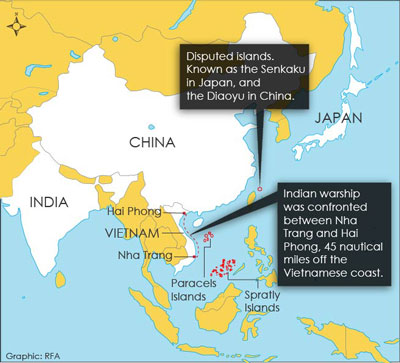




As Southeast Asia stands up against what some states call Chinese bullying over territorial sea disputes, Japanese patience appears to be wearing thin with Beijing's more assertive stance in the East China Sea.
New Japanese Prime Minister Yoshihiko Noda has signaled he will not be a pushover if China moves aggressively to press its claim to a Japanese-controlled island chain in the Sea, where rich oil and gas reserves are believed to exist.
"If there's one issue that can raise the emotions of the normally calm and collected Prime Minister Yoshihiko Noda, it is Japan's territorial disputes," declared the Asahi Shimbun, a leading Japanese daily.
Three days before he was elected this week as Japan's sixth prime minister in five years, Noda lamented that Tokyo has portrayed "a weak image when it comes to territorial issues" and "we should be prepared in case something happens."
He anticipates a Chinese provocation as Beijing prepares for a once-in-a-decade leadership transition beginning next year, when Vice President Xi Jinping succeeds President Hu Jintao as Chinese Communist Party chief and as the country's leader in early 2013.
"For that country, next year is a transformation period as its leadership will change," Noda said, without naming China. "There is a possibility that the country will take provocative action against Japan."
The 54-year-old Noda's positions on foreign policy and defense are generally center-right. His father was a member of the Self-Defense Forces, as the military is called in Japan, and has been a strong supporter of the U.S.-Japan alliance.
Disputed islands

Only a week before his election on Tuesday, Japan lodged a formal protest to Beijing when two Chinese ships briefly entered what it regards as its territorial waters near the disputed East China Sea islets, known as Senkaku in Japan, or Diaoyu in China.
Beijing shrugged off the protest. Chinese foreign ministry spokesman Ma Zhaoxu said China's sovereignty over the islands was "indisputable."
"The test of wills that goes on all the time over the Senkaku/Diaoyu islands—that in particular is a disaster waiting to happen," Richard Bush, director of the Center for Northeast Asian Policy Studies at Washington-based Brookings Institution, told RFA.
"The two governments need to get a handle on this," he said.
Last year, Japan's arrest of a Chinese fishing boat captain in the same area triggered bilateral tensions that lasted several months and led Beijing to halt discussions on joint exploitation of gas reserves in the disputed area.
But reconciling the differences between Asia's two biggest economies over this longrunning dispute over the islands may not be easy.
"After last year’s Sino-Japanese clash over a Chinese fishing trawler’s provocations, it is clear that unlike [Japanese Prime Minister Shizo] Abe in 2006, Noda does not have a strong partner in reconciliation in today’s China," said Sheila Smith, senior fellow for Japan studies at the New York-based Council on Foreign Relations (CFR).
"Rather, he has a Sino-Japanese relationship that is tense and easily riled," she said, adding it would be wise for Noda to "build the domestic basis for a strategic approach to China, one that prepares for some rough waters on the way to that 'win-win' outcome."
Other experts believe Noda will be able to navigate his way through the territorial conflict with quiet diplomacy.
"[H]e is known as a good listener and is less ideological than some other pro-defense Diet (Japanese parliament) members of his generation," said a report by the Washington-based Center for Strategic and International Studies.
"For these reasons, he is expected to work on quiet diplomatic resolutions to territorial disputes with Japan’s neighbors."
Chinese critics
Even before he took office Friday, the Chinese media had harsh words for Noda as Premier Wen Jiabao and the Chinese Foreign Ministry each sent brief messages congratulating him.
The media and other commentaries played up his remarks backing a controversial Tokyo shrine honoring World War II dead, including war criminals, and wanted him to avoid visits to the Yasukuni Shrine where 14 war criminals are among the honored war dead.
The official Xinhua news agency said Noda’s new government must show respect for China's territorial integrity, adding that China is willing to jointly explore for resources around the islands on condition that Japan recognize Beijing's complete sovereignty over them.
"I think if you went back and looked at the commentary about Shinzo Abe, who became prime minister in September of 2006, you'll find many of the same things and even worse, and much worse," noted Brookings expert Bush.
"But look at what happened. Abe never went to Yasukuni as prime minister, China-Japan relations improved a great deal and the two governments were able to handle things in a pretty much constructive way and all the predictions turned out to be misguided."
Increasing assertiveness
Most analysts agree China is becoming increasingly assertive in its territorial claims in the region.
Its claim over the entire South China Sea, which is believed to hold valuable oil and minerals, has made the vast waters one of the region's key strategic flashpoints and underscored China's military ambitions.
Beijing last month launched its first aircraft carrier, unsettling its Asian neighbors.
Tensions flared in the Sea in May when Chinese ships allegedly rammed one Vietnamese oil survey ship and cut the exploration cables of another, while sailors from China's navy reportedly assaulted the captain of a Vietnamese fishing boat and confiscated its catch.
Earlier this week, Indian officials said that an Indian naval vessel was confronted by an unidentified vessel saying it was from the Chinese navy in South China Sea waters off Vietnam in July.
Reports said the incident occurred in international waters shortly after India's amphibious assault ship INS Airavat completed a scheduled port call in Vietnam.
The INS Airavat visited Nha Trang in south-central Vietnam and the northern port of Haiphong in the second half of July.